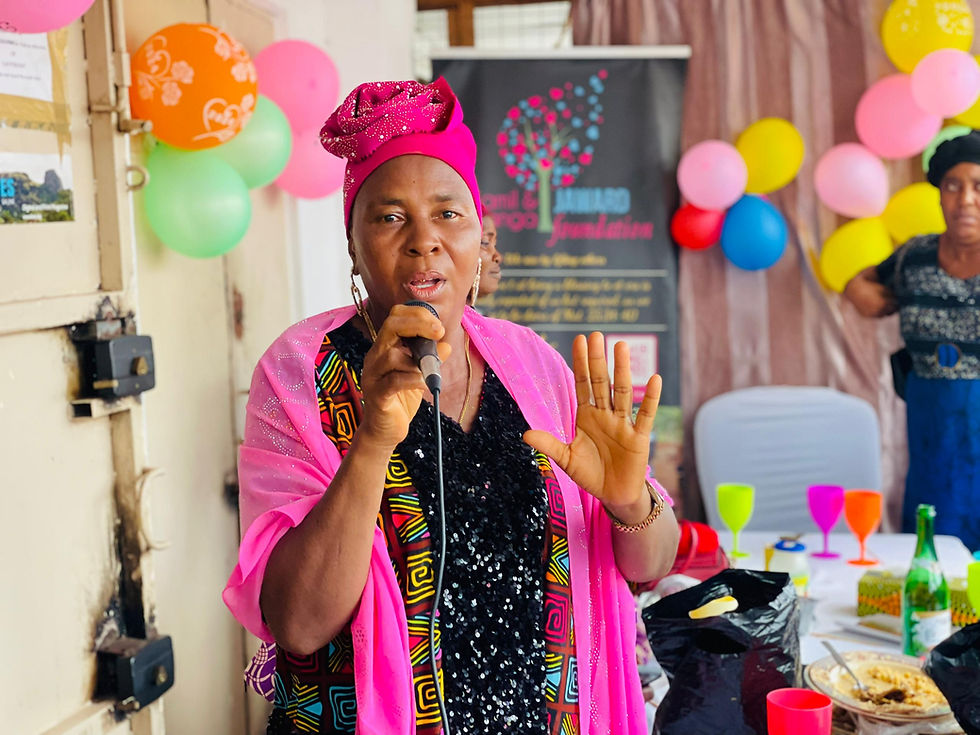The law is there, but beyond paper, does it truly exist?
- Nov 10, 2025
- 4 min read
By: Augusta Osmatu Bangura
A young woman arrives at the Family Support Unit clutching her baby, her left eye swollen, her voice barely above a whisper. It isn’t the first time she’s been hit, but it is the first time she has dared to report it.

It happened hours earlier on the outskirts of Freetown. Children sat quietly in a compound, too small to understand the raised voices that broke the afternoon calm. The neighbours stayed silent; they had heard it all before. When the noise died down, the children wiped their faces and pretended nothing had happened, because, after all, what could they do?
Cases like hers are disturbingly well documented, so much so that it is largely seen as a way of life. In another, much less documented case, a man walks into the Family Support Unit. He wears his bruises on the inside; his self-worth has been eroded by years of emotional and psychological abuse, constantly told he was nothing and would never amount to anything. For him, there is no escape from the voice that lives in his home. He has lived with the fear that if he speaks out, he will be ridiculed. Emotional abuse by his wife? The very idea is unfathomable for most people. Yet, cases like his are far more prevalent than it may seem.

These are different faces of the same problem, silent stories echoing in homes across Sierra Leone. For many, help begins only when they reach places like the Family Support Unit, or when someone tells them there’s a law meant to protect them.
When the Domestic Violence Act was passed in 2007, it was hailed as a breakthrough, a promise that Sierra Leone was finally drawing a line against abuse within the home. Yet, years later, behind closed doors and quiet compounds, the echoes of pain still linger. Domestic violence remains a harsh reality for too many, hidden beneath layers of silence, fear, and cultural acceptance.

The law defines domestic violence not just as physical harm, but as any act of abuse: physical, sexual, emotional, verbal, psychological, or economic, within the home or family relationship. It offers protection, prosecution, and the right to safety. But in practice, these rights still depend on who knows them, who dares to speak, and who listens when they do.
At the Family Support Unit (FSU), the cases come in waves; women, children, and sometimes men, each carrying stories that mirror one another in pain and helplessness. The law exists, but there’s a huge gap between its presence on paper and its enforcement in reality.
Across the country, the Family Support Unit (FSU) of the Sierra Leone Police and L.A.W.Y.E.R.S. (Legal Access through Women Yearning for Equality Rights and Social Justice) try to bridge the gap between policy and protection.
Chief Inspector of Police Lansana Tarawally of the Family Support Unit admits that despite progress, many are unaware of the law’s provisions.
“But some people are well aware; they make reports when they have issues of domestic violence, sexual offences, and related matters. A baseline survey helps us to understand how to expand the unit’s presence in remote areas where people can’t easily access or understand the information.”
The FSU currently operates in all district headquarters and “94 stations and posts across the country.” Yet, Tarawally says, the challenge lies not only in reach but in continuous engagement. “We are always engaging on a quarterly, yearly, and even monthly basis,” he explains. “Our target groups are the schools, the marketplaces, and other institutions. So it’s not only in specific areas; across the country, FSUs engage communities to help people understand the laws and their consequences.”
Still, the FSU faces a delicate balance between awareness and action. Many survivors hesitate to report due to stigma or lack of trust. “The more awareness, the more reports we receive,” he says. “People are beginning to understand the laws and know where to go, and that’s progress.”
While the FSU focuses on prevention and enforcement, L.A.W.Y.E.R.S. pushes for justice and reform. “Our mandate is to protect and promote the rights of vulnerable women and girls in Sierra Leone,” says Menisa Sesay Esq, President of L.A.W.Y.E.R.S. The organization offers free legal representation for women and girls, particularly in cases of sexual or gender-based violence. “We provide free legal services and representation,” Sesay emphasizes. “And we also raise awareness on gender laws, not just in Freetown, but in the provinces as well.”
That awareness work spans social media, radio, and in-person community engagements. “We’re using all platforms: social media, print, and electronic media,” she says. “We go down to the provinces to engage women and girls, and also community stakeholders on the various laws that protect them.”
As an organization, L.A.W.Y.E.R.S. seeks to provide justice and its access to victims and survivors. It focuses on Sexual and Gender-Based Violence (SGBV) cases and maintenance matters.
Looking ahead, L.A.W.Y.E.R.S. plans to strengthen implementation and expand outreach. “We’ll continue engaging stakeholders to ensure the laws are implemented,” Sesay says. “We’ll keep raising awareness, because many women don’t even know when their rights are being violated. We want to reach more communities, especially in rural areas, and keep pushing for law reforms that protect women and girls.”
From police units to legal advocates, Sierra Leone’s fight against domestic violence is ongoing; complex, yet determined. The Domestic Violence Act may have been passed nearly two decades ago, but its true power lies not in the pages of law; it lies in the people working daily to make its promises real.



Comments